How to Buy a Car Out of State (Tips, Pitfalls, and Savings)
April 1, 2021
I am a serial entrepreneur and a consumer advocate. When I’m not helping car buyers, I love working on ventures that have a positive impact. I run a cause marketing agency and serve on the board of Vayu Global Health where we are disrupting the medical industry and preventing the needless deaths of mothers and babies during childbirth.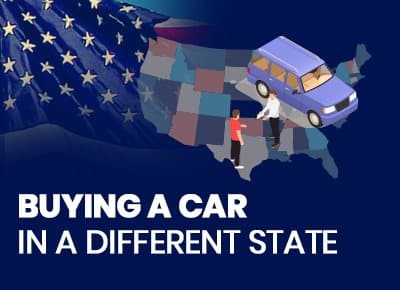

Getting prices from several dealers is the best way to get a deal. But what happens if you only have one local dealer...or none?
Well, you can expand your search to zip codes in nearby cities and states as well. A couple hours of travel could save you hundreds or even thousands of dollars.
But what are the implications of buying a car in another state?
In this guide, I’ll explain why you might want to buy a car in another state and how to do it.
Table of Contents
- How to Buy a Car Out of State Video
- Benefits of Buying a Car Out of State
- Drawbacks of Buying a Car in Another State
- What is the Cheapest State to Buy a Car?
- If I Buy a Car in Another State Where Do I Pay Sales Tax?
- Buying a Car Long Distance From a Dealer
- How to Buy a New Car Out of State
- How to Buy a Used Car Out of State
- How Far to Travel When Purchasing a Car
- Frequently Asked Questions
- Best Car Deals by Category
How to Buy a Car Out of State Video
Benefits of Buying a Car Out of State
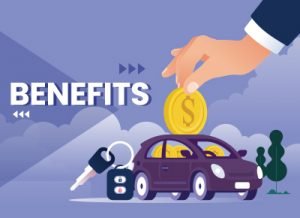 There are some cases when buying a car in another state is better than buying one locally.
There are some cases when buying a car in another state is better than buying one locally.
The main reasons to consider buying a car long distance are:
- Adding more competition drives down car prices. The more dealers you include in your search, the more they must each lower their price to win your business.
- Finding limited inventory. You may have better luck finding a specific model and trim that is not available locally. You’ll have more choices when you broaden your search beyond your state’s borders.
- Out of town dealerships may have local promotions. Incentives frequently vary by geography and you may find better incentives in other states.
- Local supply and demand varies. A dealer may be willing to discount a car in another state if they have surplus inventory or if local demand is low.
Drawbacks of Buying a Car in Another State
While you can save a lot of money by purchasing a vehicle in another state, there are some things to consider. The common drawbacks of buying a car from a distance include:
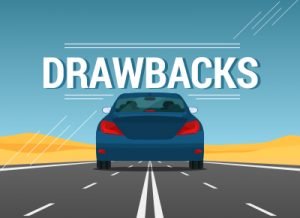 Complexity. Buying a vehicle in another state is a more complicated process that requires you to research your own sales tax, registration, and emissions requirements.
Complexity. Buying a vehicle in another state is a more complicated process that requires you to research your own sales tax, registration, and emissions requirements.- Transportation. You must transport the vehicle back to your home state by either going to pick it up or shipping it to your destination.
- Greater risk when buying used. Buying a used car always requires careful planning and consideration, but it is even harder when doing so from a distance. It is not as easy to inspect the car prior to purchase when it’s in another state, or you could end up traveling all the way to the car just to realize it is not what you are looking for.
- No saving on sales tax. While it can seem alluring to buy a car in a state with little or no sales tax, you will not save any money on that aspect since you must pay the sales tax for your home state. However, there are a few circumstances where you can take advantage of states with no sales tax.
What is the Cheapest State to Buy a Car?
 Florida is the cheapest state to buy a car. On average, initial prices in Florida are 10% less than the rest of the country. Florida is typically a “buyer’s market”, with many older drivers or wealthier residents frequently selling used vehicles. Additionally, the lack of harsh winter weather ensures used cars stay in better condition.
Florida is the cheapest state to buy a car. On average, initial prices in Florida are 10% less than the rest of the country. Florida is typically a “buyer’s market”, with many older drivers or wealthier residents frequently selling used vehicles. Additionally, the lack of harsh winter weather ensures used cars stay in better condition.
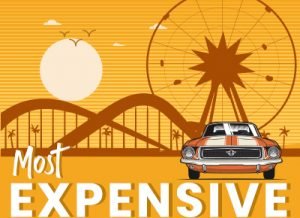 In contrast, California is the most expensive state to buy a car. The high cost of living and the tendency to hold onto cars limits the used car market and creates a “seller’s market”.
In contrast, California is the most expensive state to buy a car. The high cost of living and the tendency to hold onto cars limits the used car market and creates a “seller’s market”.
The cheapest state to buy a car will also depend on the specific car that you are looking for. Each state has different manufacturer rebates, financing incentives, and deals.
Prices for used vehicles will also vary by region. Warmer areas will have a higher demand for convertibles, so the prices for those types of cars will be lower in colder states with long winters. On the other hand, four-wheel-drive vehicles like trucks and SUVs are in higher demand in northern states that experience a lot of snow, so you could find those types of cars cheaper in Southern states.
If I Buy a Car in Another State Where Do I Pay Sales Tax?
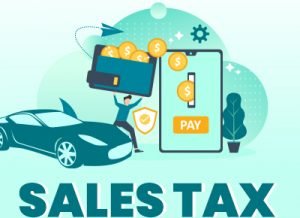 You will pay sales tax in the state where you register your car, not the state where you bought the car. Many people think they can buy a car in a state with zero sales tax to save money, but unfortunately, that’s not how it works.
You will pay sales tax in the state where you register your car, not the state where you bought the car. Many people think they can buy a car in a state with zero sales tax to save money, but unfortunately, that’s not how it works.
If you buy from a dealer, generally you will pay the dealer for the sales tax and they will remit it to your home state for you. However, dealers sometimes mistakenly tax out-of-state buyers at the same rate as if they were in-state. Or they may miss collecting any applicable local sales taxes for your jurisdiction. In either case, if the dealer does not collect the full amount, then you must make up any difference at the DMV once you are home and register the car.
If you buy from a private seller, then you must pay your sales tax to your home state yourself when registering.
Buying a Car Long Distance From a Dealer
Buying a car long-distance from a dealer can help you get the exact vehicle you want. When you buy new from a dealer you can test drive locally and get assurance that the car will be the same wherever you buy. That means you can shop out of state to find the best deal as out-of-state dealerships may have incentives that yours does not.
When you buy a used car from a private party, you run the risk of travelling far before you see the vehicle, so extra precautions are necessary. Buying a used car from a dealer still has some risks, but is generally safer as used car dealers have their business reputations at stake, but you should still use caution.
Let’s look at the steps to buy both new and used cars out of state.
How to Buy a New Car Out of State
 Here are the steps to buy a new car out of state:
Here are the steps to buy a new car out of state:
Step 1 - Test Drive Locally
Head to your local dealerships to test drive potential cars. Use these test drives to determine the specific model, trim level, and options that you really want. Since similarly equipped new cars are the same everywhere in the country, you can find the exact car you want locally but buy remotely.
Step 2 - Compare Prices From Several Dealers
Never assume that you will get the best deal in or out of state. Instead, you should get price quotes from multiple dealerships both locally and in different states. You’ll get the best deal by getting quotes from at least 5 dealers. Contact all these dealers and negotiate over email. Learn exactly how to negotiate over email in this guide.
Tip: Here's how to reach dealers in other states and get their prices. Pick a city using this U.S. zip code map and click "Get Prices" at the top of this page. Then enter your desired zip code and dealers in that area will be listed.
Step 3 - Pay Sales Taxes and Get a Temporary Registration
Most times, you will need to pay the sales tax before you can register your car. Additionally, you will need a temporary registration to drive the car back to your state. Franchised dealers will be able to help with the paperwork for the taxes and temporary registration. However, you should still make sure that you know the sales tax policy in your state since that is ultimately what you are responsible for paying. Here's the full list for the car sales tax by state.
Step 4 - Obtain the Car
You will then need to pick up the car or have it shipped to you.
Usually driving to pick up a car is your cheapest bet, depending on how far away the dealer is. If you have to pay for a flight or a hotel stay, be sure to compare that cost to your savings.
If you decide to have the vehicle shipped, you can either pay the dealer to ship it for you or you can hire a shipping company yourself and you’ll usually want to purchase insurance for transport.
How much do dealers charge to ship cars?
Dealers can arrange shipment directly to you for about $750 to $1000.
Step 5 - Get an Emissions Test
Once you have the car, you need to have it inspected to ensure it passes the requirements for your state. Often, this includes an emissions and odometer inspection. Again, a dealer will help you ensure the vehicle will pass emissions in your state. Several states and the District of Columbia have adopted standards set by The California Air Resources Board (CARB) and also require a smog test before registering a vehicle to ensure it meets emissions requirements.
Step 6 - Get Your Title and State Registration
When you get your car home, you must register the car in your home state. You typically have 30 days to do this after purchase. Visit the DMV to handle your paperwork and obtain your official title and registration.
Step 7 - Get Insurance
Lastly, you need to insure your car. If you already have insurance for a different car, then you can contact your agent and typically have the insurance adjusted. It’s best to call your insurance company ahead of time and explain the situation so that you understand their policies, grace period, and other important details.
How to Buy a Used Car Out of State
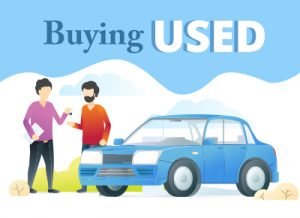 When you buy used, you must perform extra due diligence to ensure that the vehicle is in the best possible condition. Here are the steps for buying a used car out of state:
When you buy used, you must perform extra due diligence to ensure that the vehicle is in the best possible condition. Here are the steps for buying a used car out of state:
Step 1 - Choose a Model
First, you need to decide on the type of car you want. All used cars are slightly different, but you can still test drive a few models to get a feel for your preferences.
Step 2 - Search for a Vehicle
Search for vehicles for sale that fit what you are looking for. You can check at used-car dealerships or private-seller postings like Craigslist or Carvana. Avoid scams by only considering listings with ample photos, descriptions, and the VIN.
Step 3 - Get a Vehicle History Report
You will want to obtain a vehicle history report from somewhere like Carfax. This report will make sure there are no liens or other issues that would hinder your purchase.
Step 4 - Get the Vehicle Inspected
Next, you should have the car inspected prior to purchase. Contact a mechanic near the private seller or used dealership ahead of time and hire them to inspect the vehicle. If it is an online dealership with a free return policy, then you can have the car inspected as soon as it’s delivered.
What does it cost to have a mechanic inspect a used car?
Almost all dealerships, garages, and auto repair shops provide a pre-purchase inspection at a cost between $100 to $200.
Step 5 - Negotiate a Price
While you should have a price in mind before picking up the car, the inspection will give you even more information. Make it clear to the seller that you may adjust your offer after the inspection. Use that information to negotiate a fair price with the seller.
Step 6 - Obtain the Car
Just like when buying new, you can pick up your used car or have it shipped to you. There is a risk when buying from a private seller virtually. If possible, it may be safest to pick up the car so that you can double-check that everything is correct before you bring it home. Should you decide to have it shipped, use a certified escrow account to hold the money until you receive the car.
Step 7 - Pay Sales Taxes and Get a Temporary Registration
Most states require that you pay sales tax to the DMV when you register your car. Dealerships will often collect this for you and remit to the state. Do not pay this to private sellers.
If you buy from a private seller, chances are that you will need to apply for the temporary registration at that state’s local DMV before you drive home. Always make sure that you have your VIN (vehicle identification number) so that you can officially register the car when you get home.
Step 8 - Get an Emissions Test
Every state has its own emissions requirements. The vehicle you buy in one state may not pass the emissions test in your state. California (among other states) has some of the most stringent emissions laws. If you live in California or another state with very strict emissions standards, check that the car is “California certified” before buying.
Step 9 - Get Your Title and State Registration
Pay for the new title and registration at your home state's DMV. Make sure to correctly title your car within 30 days of purchase.
Step 10 - Get Insurance
Just like when buying a new car from out of state, you will need to insure a used car that you purchase as well. Again, it is advisable to call your insurance company ahead of time and explain the situation so that you do not run into any issues.
How Far to Travel When Purchasing a Car
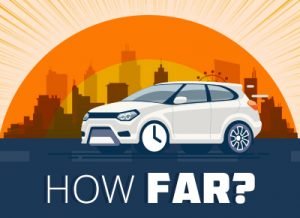 Many people choose to purchase a vehicle in another state for the savings. But how far should you travel? The key is to only choose a distance that makes sense based on your savings. You must weigh the travel expenses against your savings on the purchase to determine if it makes sense.
Many people choose to purchase a vehicle in another state for the savings. But how far should you travel? The key is to only choose a distance that makes sense based on your savings. You must weigh the travel expenses against your savings on the purchase to determine if it makes sense.
Many buyers will travel to the next state over to save big on purchasing a car. Typically, this is what makes the most sense. The first thing you should do is expand your search to nearby cities. If you find one you like, you can test-drive at your local dealership and even give them an opportunity to beat the price, which may save you the trip. However, in some cases, it does make sense to buy across the country for big enough savings. One woman from South Dakota saved $8,500 when she purchased her Lexus GX 460 in Roswell, Georgia. In her case, it was well worth it to shop in another state, even one so far away!
Buying a car from a distance can save you a lot of money when you handle the process carefully. The key to the best deal is to compare cost-savings to travel/transportation costs and to price compare before making the purchase.
Frequently Asked Questions
Do I have to pay taxes twice if I buy a car out of state?
No, you will only pay taxes once to the state where you register the car. If you buy from a dealer they will often collect this for you and remit to your home state.
Why should I consider buying a car out of state?
Expanding your search to other cities and states gives you more options and often drives down the price by introducing more dealer competition.
How do I save money by purchasing a car in a different state?
The primary way that you can save money by purchasing a car out of state is by finding deals from dealerships or private sellers that are not available in your area. Dealers may have different specials in different areas, and the market value of a car is not the same in every location.
How far should I travel to buy a car?
Many people find an excellent deal in a bigger city in their own state or in a neighboring state. Others save thousands of dollars by purchasing a car across the country. Weigh your savings with the expense and hassle of travel/ transportation to decide what a good distance is.
Where do I pay sales tax if I buy a car out of state?
You pay sales tax to the DMV in the state where you register the car, not where you buy it. Often times, the dealership will collect your state's sales tax and then remit it to your home state for you.
Best Car Deals by Category
Posted in Car Buying Tips |




